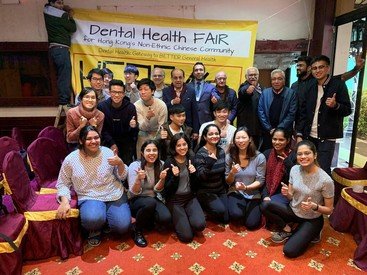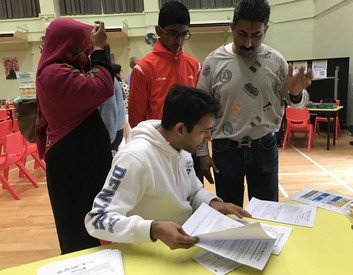Helping Minorities Access Dental Health
We have uncovered an obvious need for oral health education and dental care services; something that cannot be ignored.
Hong Kong’s minority groups often miss out on healthcare information that locals take for granted. This can happen because of a lack of local language skills or a tendency to move in different social or community circles. One important area of knowledge affected is access to dental care, where neglect may lead to serious gum disease, tooth decay and high levels of pain.
For the last three years, Dr Prasanna Neelakantan, Clinical Assistant Professor in Endodontics of the Faculty of Dentistry, has been working closely with NGOs including the Indian, Pakistani and Nepali associations of Hong Kong to deliver much-needed primary checks and information on where to go for follow-up treatment to the city’s South Asian communities. With the Faculty, he launched the ‘Gateway to Dental Health’ in 2017 to help improve the oral health of the city’s non-ethnic Chinese communities. In the last couple of years, he has held seven dental health fairs, providing practical and hands-on dental care, including initial dental screening, application of fluoride, demonstration of brushing and flossing techniques, and providing information on where to go for dental treatment in Hong Kong.
His awareness of the need for dental care among these populations arose through his social contacts when people he met asked for his advice on where they could go for treatment. “That’s when it dawned on me that some of these people had been ill for so many yearswith no knowledge on existing services available and methods to seek treatment,” he explained.
Treatment is provided by a team of volunteer helpers including graduates and postgraduate students, who get a valuable opportunity to learn about patient care and the chance to treat patients from different cultures.
Dr Neelakantan takes his expertise directly to his target audience, conducting dental fairs at schools and other places where the city’s Indian, Pakistani, Nepalese and Sri Lankan residents congregate, and spreading the word about the service through radio interviews and Facebook. For these groups, “in terms of cultures and language, there’s a lot of similarities,” he said.
As well as working with the community-based national associations, he also partners with Health in Action, whose health professionals assist in providing primary advice, and Voices of Diversity.
As the scale of the need becomes apparent, he is hoping to find donations or philanthropic support to expand the scope of his work. “We’re just scratching the surface,” he said, estimating that he has reached about one to two per cent of those in need. “Our funding is limited to screening. To provide treatment, we need a lot more funds.”
Although Dr Neelakantan’s work has been curtailed by the pandemic, he has continued his outreach by leading a webinar conducted in Urdu, Hindi and English, sharing oral health care tips and answering questions on the topic.
Dr Prasanna Neelakantan and his team members, Professor Chun Hung Chu and Dr Mike Yiu Yan Leung, received the Faculty Knowledge Exchange Award 2020 of the Faculty of Dentistry for the project ‘Empowering Non-governmental Organizations to Improve the Oral Health Status of Non-Ethnic Chinese (Ethnic Minorities and Migrant Workers) in Hong Kong’.




